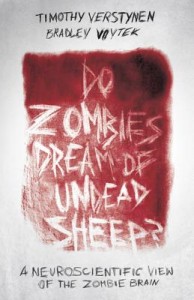 Last fall, I indulged my occasional soft spot for quirky young adult stories with Warm Bodies, a contemporary retelling of Romeo and Juliet via the love story between a zombie and a human.
Last fall, I indulged my occasional soft spot for quirky young adult stories with Warm Bodies, a contemporary retelling of Romeo and Juliet via the love story between a zombie and a human.
(SPOILER ALERT)
Inexplicably, the love between human Julie and zombie R manages to reverse whatever virus caused the mass zombification in the first place. While I enjoyed the story, the idea that zombies could be somehow reanimated didn’t sit very well with me. It just doesn’t fit with the broader characteristics we associate with zombies.
Imagine my nerdy joy when I unexpectedly found an answer to this very zombie question in Do Zombies Dream of Undead Sheep? – my first read in last months Readathon.
In Do Zombies Dream of Undead Sheep? neuroscientists Timothy Verstynen and Bradley Voytek try to explain what the zombie brain might look like, based on the typical characteristics of zombies – endless wandering, lumbering gait, insatiable hunger, antisocial behavior, and memory loss.
Because it would be impossible to take an MRI or other image of a zombie brain, Verstynen and Voytek use the strategies of classical neurology to speculate about the the brains of undead zombies. This technique uses observation and experimentation – often looking at animals and people who face some kind of serious brain injury – to try and see which parts of the brain affect different types of behavior or skills.
Each chapter follows a similar structure: ask a question about zombie behavior, offer explanations of relevant brain anatomy and neurological disorders, then diagnose the disorder affecting the zombie brain. Using that format, Verstynen and Voytek explore why zombies can’t speak, why some zombies move fast while others move slow, and why zombies have a hard time remembering people from their pre-zombie lives.
And there’s even an explanation for the “zombies” in Warm Bodies! Verstynen and Voytek argue that because R was aware of his condition as a zombie and eventually does start to feel alive again, he isn’t really a zombie. Instead, the “zombies” of the movie are suffering from “infectious transmitted mass Cotard’s delusion” – a syndrome where patients believe some part of them is actually dead – “that is cured by reestablishing contact with others.” Isn’t that cool?
It’s clear from the beginning that Verstynen and Voytek are both passionate neuroscientists and passionate zombie nerds. Their explanations of how the brain works are clear (if sometimes a little academic for my taste) and their evidence from zombies in pop culture is wide-ranging. I was familiar with about a third of the movies they referenced, but I didn’t find that a boundary to understanding what they were discussing.
The premise of the book is clearly silly, but it’s also the perfect way to dig into brain anatomy in a way that is memorable and fun. I enjoyed this one a lot that I will definitely recommend to the academic zombie nerds in my life.

Comments on this entry are closed.
As someone currently obsessed with the Walking Dead, this book sounds so great!
This sounds like such a fun read!
OMG!! I had no idea about this book. Thank You for bringing it to my attention. I am putting it on my TBR pile NOW.
It’s from Princeton University Press, so I’m sure it’s not getting a ton of extra publicity — I’m glad I could give it some attention!
I love nerds and geeks; they have the most interesting discussions face-to-face and in print. I will have to check this out.
One of the notes in the back of the book credited one of the author’s freshman colloquium classes for help with the book — it totally reminded me of one of those freshmen classes where you get to have ultra nerdy discussions.
Well, it’s good to know someone finally considers the neuroscience of this topic! I expect that the cultural conversation about zombies will surely become much more academic and evidence-based now. 🙂
Sounds like a fun read!
Sounds so fun! I love this idea. It’s like the whole “Law of Superheroes” thing — did you ever read that blog? I got an enormous kick out of it.
No, I hadn’t heard of that! But I am going to find it — sounds totally awesome.